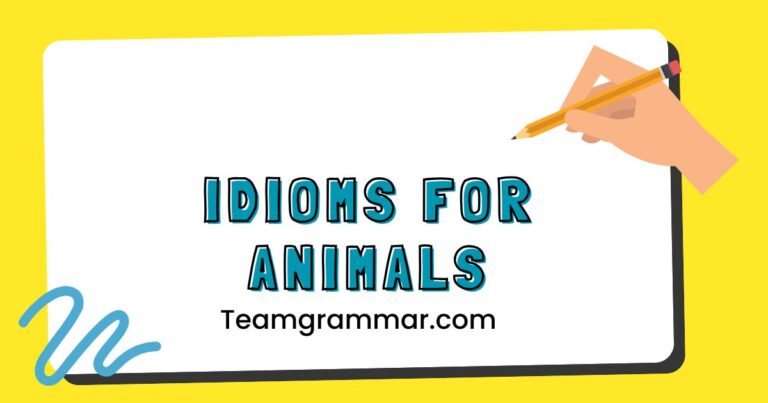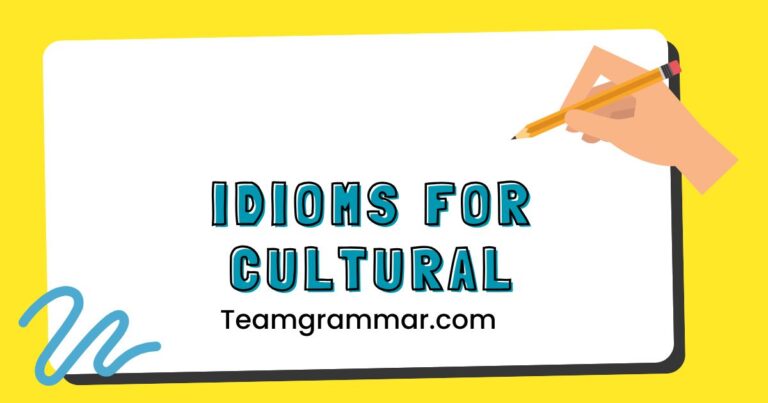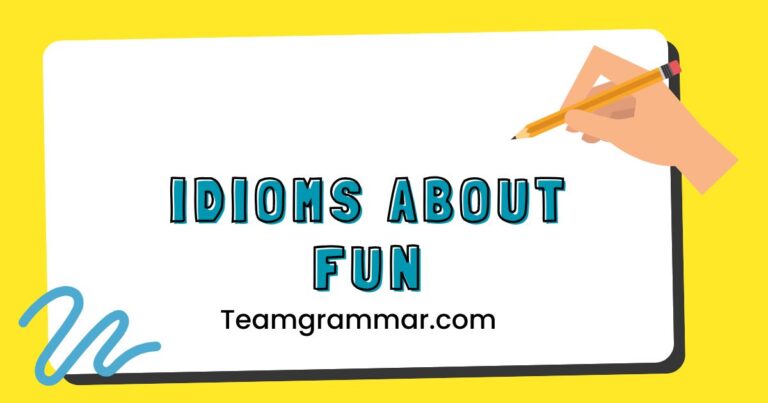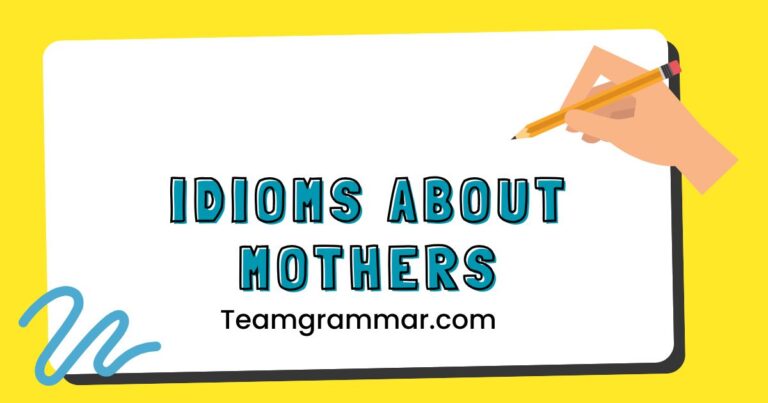38 Idioms for ‘Great’: Mastering English Expressions
Idioms add color and depth to the English language, allowing for nuanced expression beyond literal meanings. Specifically, idioms that convey the idea of ‘greatness’ or excellence are essential for expressing enthusiasm, admiration, and high praise.
Understanding these idioms not only enhances comprehension but also allows learners to communicate more effectively and naturally. This article explores a variety of idioms that express ‘greatness,’ providing definitions, examples, and practical exercises for English language learners of all levels.
Table of Contents
- Introduction
- Definition of Idioms for ‘Great’
- Structural Breakdown
- Types and Categories of Idioms for ‘Great’
- Examples of Idioms for ‘Great’
- Usage Rules for Idioms for ‘Great’
- Common Mistakes When Using Idioms for ‘Great’
- Practice Exercises
- Advanced Topics
- Frequently Asked Questions (FAQ)
- Conclusion
Definition of Idioms for ‘Great’
Idioms are expressions whose meanings cannot be understood from the literal definitions of the individual words. An idiom for ‘great’ is a phrase or expression that conveys a sense of excellence, superiority, or high quality.
These idioms function as adverbs, adjectives, or even verbs within a sentence, adding emphasis and vividness to descriptions. They are often figurative and deeply embedded in cultural contexts, making them essential for achieving fluency in English.
The classification of idioms for ‘great’ falls under the broader category of figurative language. They serve the function of intensifying the meaning of a statement and expressing subjective opinions or feelings.
The contexts in which these idioms are used vary widely, ranging from informal conversations to formal writing, although some idioms are more appropriate for specific settings than others. Understanding the nuances of these idioms is crucial for effective communication.
Structural Breakdown
The structure of idioms for ‘great’ is diverse, encompassing various grammatical forms. Some idioms are phrases consisting of adjectives and nouns (e.g., “a roaring success”), while others are verb-based expressions (e.g., “knocking it out of the park”).
The grammatical role of the idiom within a sentence determines its structure. For instance, an idiom acting as an adjective will modify a noun, whereas an idiom acting as a verb will describe an action.
Many idioms follow specific patterns that may not adhere to standard grammatical rules. For example, the idiom “over the moon” uses a prepositional phrase to convey extreme happiness, which is a figurative extension of its literal meaning.
Similarly, the idiom “top-notch” employs a hyphenated adjective to indicate superior quality. The fixed nature of these idioms means that their structure cannot be altered without changing or losing their intended meaning.
Recognizing these structural elements is key to correctly interpreting and using idioms for ‘great’.
Types and Categories of Idioms for ‘Great’
Idioms for ‘great’ can be categorized based on the specific aspect of greatness they describe. This categorization helps in understanding the subtle differences in meaning and usage.
Idioms Describing Success
These idioms are used to express that something has achieved a high level of success or accomplishment. They often relate to achieving goals, winning competitions, or performing exceptionally well.
Idioms Describing High Quality
These idioms emphasize the superior quality or standard of something. They indicate that something is excellent, first-rate, or of the highest caliber.
Idioms Describing Intense Enjoyment
These idioms convey a feeling of extreme pleasure, happiness, or satisfaction. They are used to express that someone is thoroughly enjoying an experience or situation.
Idioms Describing Exceptional Skill
These idioms highlight someone’s remarkable talent, ability, or expertise. They indicate that someone is highly skilled or proficient in a particular area.
Idioms Describing Impressive Appearance
These idioms are used to describe someone or something that is visually striking, attractive, or impressive. They emphasize the aesthetic qualities that make something stand out.
Examples of Idioms for ‘Great’
The following sections provide detailed examples of idioms for ‘great,’ categorized by the specific aspect they describe. Each example is presented in a sentence to illustrate its usage and context.
Examples: Idioms Describing Success
This table provides a range of idioms used to describe success, offering examples of how they are used in sentences. These idioms can add flair to your descriptions of achievements and accomplishments.
| Idiom | Meaning | Example Sentence |
|---|---|---|
| A roaring success | A very successful outcome | The new product launch was a roaring success, exceeding all sales targets. |
| Hit the jackpot | To have a great success, especially unexpectedly | After years of hard work, she finally hit the jackpot with her groundbreaking invention. |
| Knock it out of the park | To do something exceptionally well | The sales team knocked it out of the park this quarter, surpassing all previous records. |
| Go down a storm | To be very popular or successful | The comedian’s new act went down a storm with the audience. |
| A smash hit | An immediate and great success | The new musical is a smash hit, with sold-out shows every night. |
| Take off | To become successful or popular very quickly | Her career really took off after she won the talent competition. |
| Make a killing | To earn a lot of money quickly and easily | He made a killing in the stock market during the tech boom. |
| Go places | To be likely to be successful in the future | With her talent and dedication, she is definitely going places in the music industry. |
| On a roll | Experiencing a period of success | The team is on a roll, winning their last five games in a row. |
| Come up roses | To end well, despite initial problems | Despite the initial setbacks, the project eventually came up roses. |
| Strike gold | To discover something very valuable or successful | The company struck gold with their new marketing strategy. |
| Go from strength to strength | To become more and more successful | The business has gone from strength to strength since the new management took over. |
| Be a winner | To be destined for success | This product is a winner, with its innovative features and competitive price. |
| Carry the day | To win or be successful | Our team carried the day in the final competition, securing the championship. |
| Sweep the board | To win all the prizes or awards | The film swept the board at the awards ceremony, winning every major category. |
| Top of the heap | To be the most successful or important | He is now top of the heap in his industry, leading the market with innovative solutions. |
| At the top of one’s game | Performing at one’s best | The athlete is at the top of his game, breaking records in every competition. |
| Laugh all the way to the bank | To earn a lot of money very easily | After selling his company, he was laughing all the way to the bank. |
| Make it big | To become very successful | She always dreamed of making it big as a Hollywood actress. |
| Reach for the stars | To aim for ambitious goals | The company encourages its employees to reach for the stars and pursue their dreams. |
| Go the distance | To persevere and succeed in the end | With hard work and determination, she went the distance and achieved her goals. |
| Turn to gold | To be very successful | Everything he touches seems to turn to gold, making him a successful entrepreneur. |
| On top of the world | Feeling extremely happy and successful | After winning the championship, the team felt on top of the world. |
Examples: Idioms Describing High Quality
This table showcases idioms that describe high quality, providing examples of their usage in sentences. These idioms are useful for expressing your appreciation of excellent products, services, or performances.
| Idiom | Meaning | Example Sentence |
|---|---|---|
| Top-notch | Of the highest quality | The service at the hotel was top-notch, making our stay very enjoyable. |
| First-rate | Excellent; of the highest quality | The restaurant offers first-rate cuisine and impeccable service. |
| Second to none | The best; unsurpassed | Their customer support is second to none, always providing prompt and helpful assistance. |
| The bee’s knees | Excellent; of very high quality (old-fashioned) | Back in the 1920s, that car was considered the bee’s knees. |
| The cat’s pajamas | Excellent; of very high quality (old-fashioned) | Her new dress was the cat’s pajamas, stylish and elegant. |
| State-of-the-art | Using the latest technology; very modern | The hospital is equipped with state-of-the-art medical equipment. |
| Cutting-edge | Highly advanced; innovative | The company is known for its cutting-edge research and development. |
| Top of the line | The best available | They only sell top of the line appliances in their store. |
| Grade A | Of the highest quality | The meat at this butcher shop is always Grade A. |
| Five-star | Of the highest quality; luxurious | We had a five-star experience at the resort, with exceptional amenities and service. |
| Blue-ribbon | Of the highest quality; award-winning | The county fair awarded him a blue-ribbon for his prize-winning vegetables. |
| Premier | Best or most important | This is the premier research institution in the country. |
| World-class | Of the highest standard in the world | The city boasts world-class museums and art galleries. |
| First-class | Excellent; of the highest quality | We traveled first-class on the train, enjoying luxurious accommodations. |
| Up to par | Meeting the required standard | The quality of the work was not up to par, so we asked for revisions. |
| In a league of its own | Significantly better than others | The artist is in a league of his own, creating masterpieces that are truly unique. |
| Tip-top | In excellent condition | He keeps his car in tip-top condition, always meticulously maintained. |
| Top drawer | Of the highest quality or social class | The event was attended by people from the top drawer of society. |
| Of the first water | Of the finest quality | The diamond was of the first water, sparkling with exceptional brilliance. |
| Nothing short of brilliant | Extremely impressive and intelligent | Her presentation was nothing short of brilliant, captivating the entire audience. |
| Above and beyond | Going beyond what is expected | The staff went above and beyond to make our stay unforgettable. |
| Best of breed | The best in a particular category | This software is considered the best of breed in its industry. |
| Par excellence | Being the best of its kind | The chef’s culinary skills are par excellence, creating exquisite dishes. |
Examples: Idioms Describing Intense Enjoyment
This table provides idioms that express intense enjoyment, complete with example sentences. Use these idioms to convey your enthusiasm and delight in various situations.
| Idiom | Meaning | Example Sentence |
|---|---|---|
| Over the moon | Extremely happy | She was over the moon when she found out she got the job. |
| On cloud nine | Extremely happy | After the birth of her child, she was on cloud nine. |
| In seventh heaven | Extremely happy | He’s been in seventh heaven since he started dating her. |
| Tickled pink | Very pleased or amused | She was tickled pink by the surprise party her friends threw for her. |
| Happy as a clam | Very happy and content | He’s as happy as a clam now that he’s retired and living by the sea. |
| Grin from ear to ear | To smile widely | He was grinning from ear to ear when he opened his birthday presents. |
| A whale of a time | A very enjoyable time | We had a whale of a time at the amusement park. |
| Living the dream | Living a life that one has always dreamed of | Traveling the world and writing about her adventures, she’s truly living the dream. |
| Having the time of one’s life | Enjoying oneself immensely | They were having the time of their lives on their vacation in Italy. |
| Like a kid in a candy store | Very excited and delighted | He was like a kid in a candy store when he got his new computer. |
| Blowing one’s mind | To be very impressed or excited | The special effects in the movie were blowing my mind. |
| Getting a kick out of something | To find something very enjoyable or amusing | I’m getting a kick out of learning to play the guitar. |
| In one’s element | In a situation where one feels comfortable and skilled | She’s in her element when she’s teaching and inspiring her students. |
| On top of the world | Feeling extremely happy and successful | After winning the championship, the team felt on top of the world. |
| Walking on air | Feeling extremely happy | She’s been walking on air since she got engaged. |
| Floating on air | Feeling extremely happy | He was floating on air after receiving the prestigious award. |
| In high spirits | Being cheerful and lively | The team was in high spirits after their victory. |
| Buzzing | Feeling excited and full of energy | The city was buzzing with excitement on New Year’s Eve. |
| Thrilled to bits | Extremely pleased | She was thrilled to bits when she heard the good news. |
| Wrapped up in something | Completely absorbed and delighted in something | He was completely wrapped up in the fascinating book he was reading. |
Usage Rules for Idioms for ‘Great’
Using idioms correctly involves understanding their nuances and context. The following rules will help you use idioms for ‘great’ effectively.
Contextual Appropriateness
Consider the formality of the situation when using idioms. Some idioms are more appropriate for informal conversations, while others are suitable for formal writing or presentations.
Using an idiom that is too casual in a formal setting can sound unprofessional. Likewise, using an overly formal idiom in a casual conversation can sound unnatural.
For instance, “knocking it out of the park” is suitable for informal settings, while “par excellence” is better suited for formal contexts.
Understanding the audience is also crucial. If you are speaking to someone who is not a native English speaker, it’s best to use idioms sparingly and explain their meanings to avoid confusion.
Similarly, be mindful of cultural differences that may affect the interpretation of idioms. An idiom that is common in one culture may be unfamiliar or have a different connotation in another.
Grammatical Integration
Ensure that the idiom fits grammatically within the sentence. Idioms should be integrated seamlessly into the sentence structure, maintaining correct grammar and syntax.
For example, if an idiom functions as an adjective, it should correctly modify a noun. If it functions as a verb, it should agree with the subject in terms of number and tense.
Incorrect grammatical integration can lead to confusion and misinterpretation.
Pay attention to the tense and form of the idiom. Some idioms have fixed forms that cannot be altered, while others can be adapted to fit different tenses or grammatical structures.
For instance, the idiom “go from strength to strength” can be used in various tenses: “The company is going from strength to strength,” “The company went from strength to strength,” etc. However, changing the core structure of the idiom would render it meaningless.
Cultural Sensitivity
Be aware of the cultural origins and connotations of idioms. Some idioms may have historical or cultural roots that are not immediately apparent.
Using an idiom without understanding its cultural context can lead to misunderstandings or even offense. For example, some idioms may have originated from specific cultural practices or beliefs, and using them inappropriately can be insensitive.
Avoid using idioms that are based on stereotypes or that could be considered offensive. Language evolves, and some idioms that were once acceptable may now be considered outdated or inappropriate.
It’s important to stay informed about current cultural norms and sensitivities to avoid causing unintentional harm or offense. When in doubt, it’s best to choose more neutral language.
Common Mistakes When Using Idioms for ‘Great’
One common mistake is themisinterpretation of the literal meaning. Idioms are figurative, so understanding the intended meaning is crucial.
Another error isusing the wrong form of the idiom, altering its structure or tense incorrectly. Finally,using idioms in inappropriate contexts, such as formal settings, is a frequent mistake.
| Incorrect | Correct | Explanation |
|---|---|---|
| She is on cloud seven. | She is on cloud nine. | The correct idiom is “on cloud nine,” not “seven.” |
| He knocked the park out of it. | He knocked it out of the park. | The correct order of words is essential for the idiom to make sense. |
| The presentation was the bee’s knees, according to our annual report. | The presentation was top-notch, according to our annual report. | “The bee’s knees” is too informal for a formal report. |
| They are in seventh heaven since their cat died. | They are over the moon since their cat was found. | Idioms must align with the context of the sentence. “Seventh heaven” implies happiness, not sadness. |
| She made a killing of the stock market. | She made a killing in the stock market. | The correct preposition is “in,” not “of.” |
Practice Exercises
These exercises will help you practice using idioms for ‘great’ correctly. Each exercise focuses on a different aspect of idiom usage, from filling in the blanks to matching idioms with their meanings.
Exercise 1: Fill in the Blanks
Fill in the blanks with the correct idiom from the list provided. Choose the idiom that best fits the context of the sentence.
- The team was ____________ after winning the championship. (over the moon / under the weather)
- Her performance was ____________; everyone was impressed. (second to none / a dime a dozen)
- He ____________ when he invested in that startup. (hit the jackpot / missed the boat)
- The new restaurant is ____________ with long lines every night. (going down a storm / raining cats and dogs)
- She is ____________ in her new role as CEO. (in her element / out of her depth)
- After years of hard work, he finally ____________ as a successful entrepreneur. (made it big / called it a day)
- The company is ____________ since the new management took over. (going from strength to strength / going through the motions)
- The project ____________ despite the initial challenges. (came up roses / went down in flames)
- The quality of their products is ____________. (top-notch / run-of-the-mill)
- He was ____________ when he received the prestigious award. (floating on air / down in the dumps)
Answers:
- over the moon
- second to none
- hit the jackpot
- going down a storm
- in her element
- made it big
- going from strength to strength
- came up roses
- top-notch
- floating on air
Exercise 2: Sentence Completion
Complete the following sentences using an appropriate idiom for ‘great’.
- The new product launch was so successful that it was a ____________.
- The chef’s culinary skills are ____________, making every dish a masterpiece.
- Since she started her new job, she has been ____________.
- The athlete is ____________, breaking records in every competition.
- The service at the hotel was ____________, making our stay unforgettable.
- He was ____________ when he found out he won the lottery.
- The company’s research and development department is known for its ____________ innovations.
- The team is determined to ____________ and achieve their ambitious goals.
- The city’s museums are considered ____________, attracting visitors from all over the world.
- After selling his company, he was ____________.
Answers: (Possible Answers)
- roaring success
- par excellence
- living the dream
- at the top of his game
- second to none
- over the moon
- cutting-edge
- go the distance
- world-class
- laughing all the way to the bank
Exercise 3: Idiom Matching
Match each idiom with its correct meaning.
| Idiom | Meaning |
|---|---|
| 1. Sweep the board | A. Extremely happy |
| 2. Over the moon | B. To be the most successful or important |
| 3. Top of the heap | C. To do something exceptionally well |
| 4. Knock it out of the park | D. To win all the prizes or awards |
| 5. First-rate | E. Excellent; of the highest quality |
Answers:
- 1-D
- 2-A
- 3-B
- 4-C
- 5-E
Advanced Topics
For advanced learners, understanding the nuances of idioms involves exploring their variations across different English dialects and delving into their historical origins.
Idiomatic Variation Across English Dialects
Idioms can vary significantly across different English-speaking regions. An idiom that is common in American English may be unfamiliar or have a different meaning in British English, Australian English, or other dialects.
For example, an idiom related to sports may be more prevalent in regions where that sport is popular. Similarly, idioms related to local customs or traditions may be specific to certain regions.
Understanding these variations is crucial for effective communication in diverse settings. Being aware of regional differences can help avoid misunderstandings and ensure that your message is accurately interpreted.
This knowledge also enhances your appreciation of the richness and diversity of the English language.
Historical Origins of Selected Idioms
Many idioms have fascinating historical origins that shed light on their meanings and usage. Tracing the etymology of an idiom can provide insights into the cultural practices, beliefs, and events that shaped its development.
For example, some idioms may have originated from maritime traditions, agricultural practices, or historical events.
Exploring the historical origins of idioms can deepen your understanding of the English language and its evolution. It can also make learning idioms more engaging and memorable.
By understanding the stories behind the idioms, you can better appreciate their nuances and use them more effectively.
Frequently Asked Questions (FAQ)
- What is an idiom, and why is it important to learn them?
An idiom is an expression whose meaning cannot be understood from the literal definitions of its individual words. Learning idioms is important because they are commonly used in everyday conversation and writing, and understanding them is essential for effective communication and fluency in English. Idioms add color and depth to the language, allowing for more nuanced and expressive communication.
- How can I effectively learn and remember idioms?
Effective ways to learn and remember idioms include: using flashcards, reading extensively, listening to native speakers, practicing using idioms in conversation and writing, and looking up the meanings and origins of idioms. Contextual learning, where you encounter idioms in real-life situations, is particularly effective. Additionally, associating idioms with visual cues or stories can aid in memorization.
- Are idioms used in formal writing, or are they only for informal conversations?
While many idioms are more appropriate for informal conversations, some idioms can be used in formal writing, depending on the context and tone. It’s important to choose idioms that are suitable for the level of formality of the writing. For instance, “top-notch” might be acceptable in a formal report, while “the bee’s knees” would likely be too informal.
- How do I know when it’s appropriate to use an idiom?
To determine when it’s appropriate to use an idiom, consider the audience, the context, and the level of formality. If you are speaking to non-native English speakers, it’s best to use idioms sparingly or explain their meanings. In formal settings, avoid overly casual idioms. Consider the cultural background of your audience, as some idioms may not translate well or may have different connotations in other cultures.
- What should I do if I don’t understand an idiom when someone uses it?
If you don’t understand an idiom, don’t hesitate to ask for clarification. You can say something like, “I’m not familiar with that expression. Could you explain what it means?” or “What do you mean by ‘that’?” Most people will be happy to explain the meaning of the idiom, which will help you learn and remember it for future use.
- Can idioms be translated directly into other languages?
No, idioms cannot typically be translated directly into other languages. Because idioms are figurative expressions with meanings that are culturally and linguistically specific, a direct translation would likely not make sense or convey the intended meaning. Instead, it’s necessary to find an equivalent idiom or expression in the target language that conveys a similar meaning.
- Are there any resources available to help me learn more idioms?
Yes, there are many resources available to help you learn more idioms. These include: idiom dictionaries, online idiom lists, language learning apps, textbooks, and websites that focus on English idioms. Additionally, reading English literature, watching English-language movies and TV shows, and listening to English-language podcasts can expose you to idioms in context.
- How do I avoid making mistakes when using idioms?
To avoid making mistakes when using idioms, be sure to understand the meaning and usage of the idiom before using it. Pay attention to the context and audience, and choose idioms that are appropriate for the situation. Practice using idioms in conversation and writing, and ask for feedback from native speakers. If you are unsure about the meaning or usage of an idiom, it’s best to avoid using it until you are more confident.
- Is it possible to create new idioms?
While it is possible to create new idioms, it is rare for them to gain widespread acceptance and usage. Idioms typically evolve over time through cultural and linguistic processes. For a new expression to become an idiom, it needs to be adopted and used by a significant number of people over a sustained period. Most new expressions remain as slang or colloquialisms rather than becoming established idioms.
Conclusion
Mastering idioms for ‘great’ is a valuable step in achieving fluency and expressiveness in English. These idioms provide nuanced ways to convey admiration, enthusiasm, and high praise, enhancing your ability to communicate effectively in various contexts.
By understanding their definitions, usage rules, and cultural connotations, you can confidently incorporate them into your vocabulary.
Continue to practice using these idioms in your daily conversations and writing to reinforce your understanding. Pay attention to how native speakers use them in different situations, and don’t be afraid to ask for clarification when needed.
With consistent effort and attention to detail, you can master idioms for ‘great’ and elevate your English language skills to a new level. Embrace the richness and diversity of the English language, and enjoy the journey of learning and discovery.







